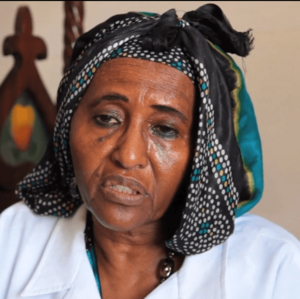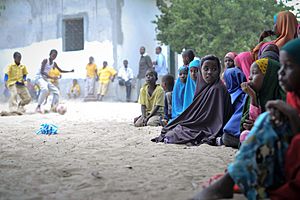Hawa Abdi facts for kids
Quick facts for kids
Hawa Abdi
|
|
|---|---|
| حواء عبدي | |

Hawa Abdi in 2012
|
|
| Born | 17 May 1947 Mogadishu, Italian Somaliland
|
| Died | 5 August 2020 (aged 73) Mogadishu, Somalia
|
| Nationality | Somali |
| Alma mater | Somali National University |
| Occupation |
|
Hawa Abdi Dhiblawe (Somali: Xaawo Cabdi, Arabic: حواء عبدي, 17 May 1947 – 5 August 2020) was an amazing Somali doctor and human rights activist. She started and led the Dr. Hawa Abdi Foundation (DHAF). This organization helps many people in need.
Contents
Early Life and Education
Hawa Abdi was born in Mogadishu, the capital city of Somalia. She grew up in the central-southern part of the country. When she was 12 years old, her mother passed away. Hawa then took on many family duties, including caring for her four younger sisters. Her father worked at the port in the capital city.
For her schooling, Hawa Abdi went to local schools. In 1964, she received a special scholarship. This scholarship came from the Women's Committee of the Soviet Union. She then went to study medicine at a university in Kiev, which is now the capital of Ukraine. She finished her medical studies in 1971.
The next year, she began studying law at the new Somali National University in Mogadishu. She worked as a doctor in the mornings. In her free time, she studied law. She earned her law degree in 1979.
Family Life
In 1973, Hawa Abdi married Aden Mohammed. He was also a Somali student she met while studying. Two years later, they welcomed their first child. They had three children in total: Deqo, Amina, and Ahmed. Sadly, Ahmed died in a car accident in 2005. Both Deqo and Amina followed in their mother's footsteps. They both became doctors.
Hawa Abdi passed away on August 5, 2020. She was 73 years old and died at her home in Mogadishu.
A Doctor's Mission
Starting the Rural Health Development Organization
In 1983, Dr. Hawa Abdi opened the Rural Health Development Organization (RHDO). She built it on land her family owned. This land was in the southern Lower Shebelle region. It started as a small clinic with just one room. It offered free services for pregnant women. About 24 women from rural areas visited each day. Over time, it grew into a large hospital with 400 beds.
When the civil war started in Somalia in the early 1990s, Dr. Abdi chose to stay. Her grandmother had told her to use her skills to help those who were vulnerable. So, she opened a new clinic and a school. These places helped people who had lost their homes and children who had lost their parents.
The Dr. Hawa Abdi Foundation
In 2007, the RHDO changed its name. It became the Dr. Hawa Abdi Foundation (DHAF). This foundation grew to include a large relief camp. During the terrible drought in 2011, the camp housed 90,000 people. These people lived on the 1,300 acres of land around Dr. Abdi's hospital.
A few years before, in 2009, some armed groups tried to close the compound. Dr. Abdi bravely refused to leave. The groups left within a week. This happened after people from the local area, the UN, and other groups spoke out. The armed groups returned in February 2012. Dr. Abdi had to stop services for a short time. But they eventually left again.
The Dr. Hawa Abdi Foundation (DHAF) was run by Dr. Abdi. Her two daughters, Deqo Adan and Amina Mohamed, also doctors, helped her. They both became specialists in women's health. In 2012, the organization had 102 staff members from different countries. They also had 150 volunteers, including fishermen and farmers.
DHAF is a non-political group. It is not connected to any government, political party, religion, or clan. DHAF decides what projects to do based on what the village needs. It is also financially independent. All its money comes from donations from people around the world. It does not accept money from governments.
Since 1991, DHAF has helped all Somalis. They do not care about a person's clan. All services are given for free.
The DHAF compound has a hospital, a school, and a nutrition center. It gives shelter, water, and medical care. Most of the people they help are women and children. Since it started in the early 1980s, the complex has helped about 2 million people.
Even though services are free, Dr. Abdi ran projects to help people support themselves. These included fishing and farming projects. The hospital also had a small farm. They grew vegetables and corn there. Some of these crops were sold to help pay for the hospital's upkeep.
Money for the compound's equipment and medical supplies came from Somalis living abroad. It also came from general donations to DHAF. Since 2011, the organization also got help from the Women in the World Foundation.
Awards and Recognition
Dr. Hawa Abdi received many awards for her amazing work. In 2007, Hiiraan Online named her their Person of the Year. Glamour magazine honored her and her two daughters in 2010. They were named among the "Women of the Year."
Two years later, she was nominated for the famous Nobel Peace Prize. She also received the Women of Impact Award. This was from the WITW Foundation. She got BET's Social Humanitarian Award and the John Jay Medal for Justice.
In 2014, Dr. Abdi received the Roosevelt Four Freedoms Award. This award was given in the Netherlands. She also won the Pilosio Building Peace Award in 2015.
In May 2016, the University of Pennsylvania gave her an honorary Doctorate of Science degree. The next year, on May 25, she received an honorary Doctor of Laws degree from Harvard University.
Works
- Keeping Hope Alive: One Woman—90,000 Lives Changed. New York City: Grand Central Publishing. 2013. ISBN 9781455599295.
See also
 In Spanish: Hawa Abdi para niños
In Spanish: Hawa Abdi para niños
 | Claudette Colvin |
 | Myrlie Evers-Williams |
 | Alberta Odell Jones |


